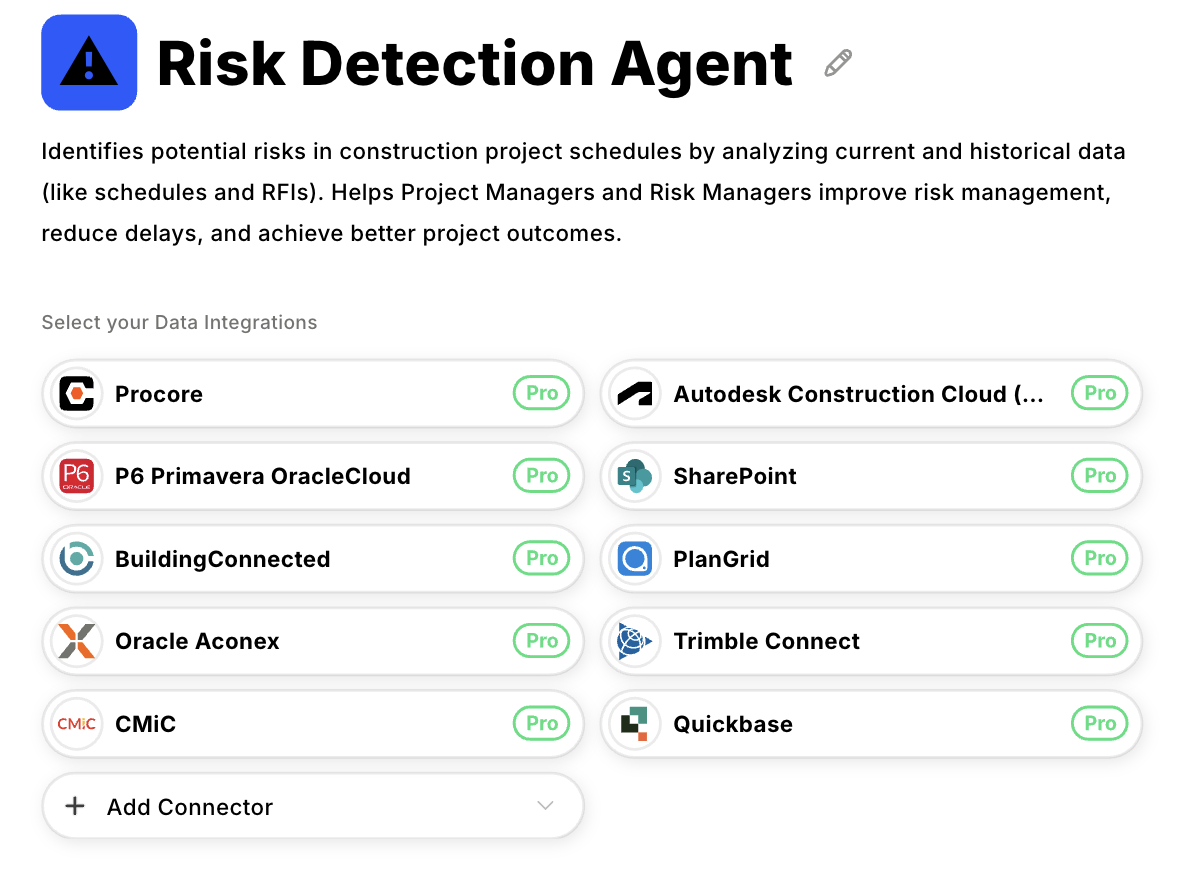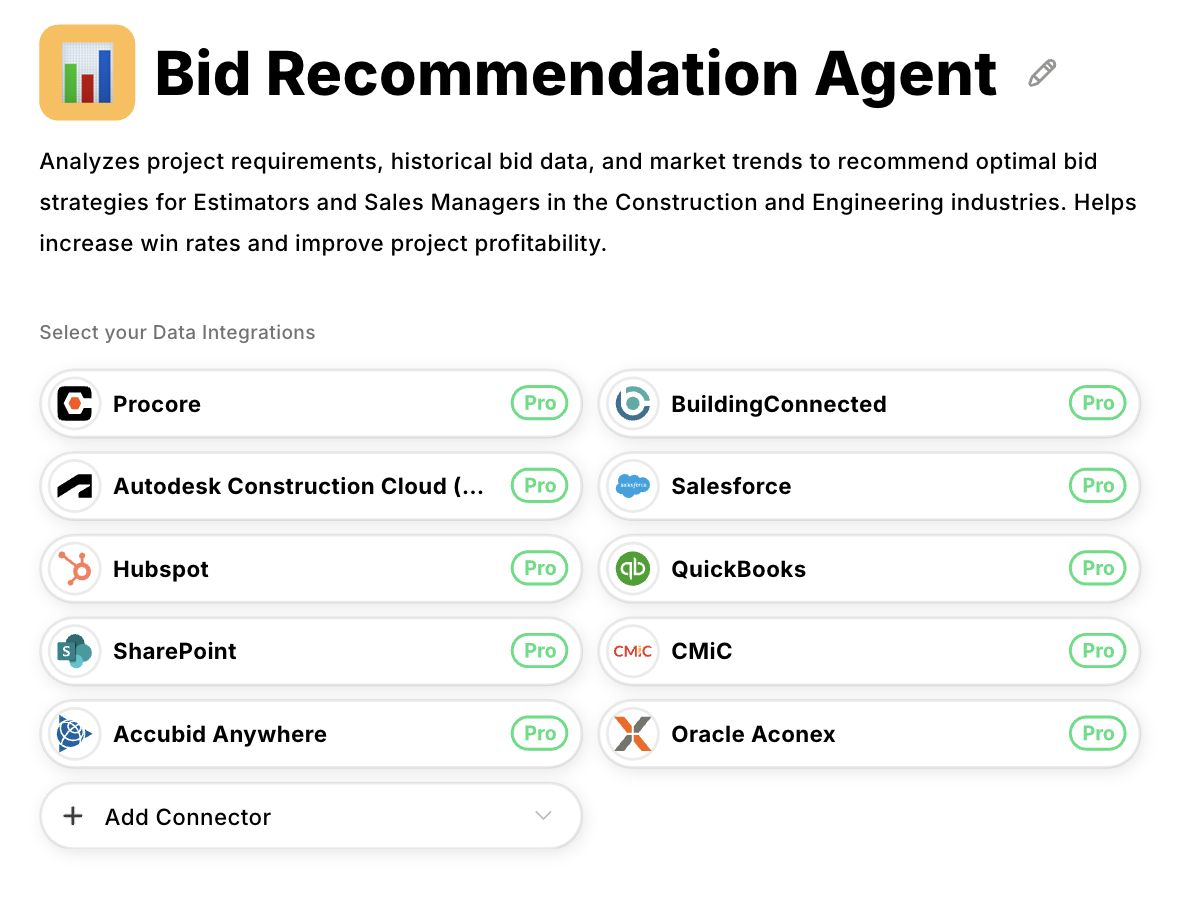Construction project management is one of the most multifaceted roles in the industry. You're responsible for keeping projects on schedule, within budget, and compliant with regulations—all while coordinating dozens of stakeholders and managing constant change.
Success requires mastering multiple interconnected skills and processes simultaneously. The daily reality? You juggle document analysis, code compliance, bid writing, scheduling, budgets, stakeholder communication, and more.
Each one is critical; each one depends on having the correct information when you need it. But that information sits buried in hundreds of pages, requiring hours of manual searching.
This article breaks down six essential PM skills and shows how AI agents eliminate the document processing bottlenecks that cap your project capacity.
Skill #1: Document Analysis and Project Initiation
Every project begins with understanding what's actually required. RFPs and contract documents define scope, deliverables, compliance obligations, and constraints.
Miss something during initial analysis, and you'll discover it during execution, when it becomes a costly change order instead of a planned line item.
Manual RFP analysis creates an impossible timeline. A comprehensive RFP runs 100-200 pages of technical specifications. You're reading page by page, pulling out requirements, cross-checking sections that conflict, and flagging compliance items. Building matrices to track everything.
Two to three weeks of sustained work. Meanwhile, bid response deadlines sit 10 days out. You're already behind before you start.
Teams face an impossible choice. Rush through and submit on time? You'll skim specifications, miss buried requirements, and send incomplete lists. Take the time to be thorough? Competitors submit first and lock in early conversations with decision-makers.
Or do a thorough analysis and submit late, after competitors have already engaged with decision-makers. Neither option works. Projects that start with rushed analysis encounter missed requirements during execution.
Those trigger change orders and scope disputes. Proposals submitted late rarely win, regardless of quality (competitors got there first). Win rates suffer because thoroughness takes too long and speed sacrifices accuracy.
AI agents eliminate this tradeoff. They can analyze a 200-page RFP in hours rather than weeks, automatically extracting requirements, specifications, and compliance checkpoints. Work that normally takes your team days happens in a fraction of the time.
Skill #2: Compliance Management and Risk Assessment
Compliance management means knowing which code, ordinance, or contractual clause applies to every project decision. Get it wrong and you're dealing with violations during inspections—expensive violations that require rework, trigger fines, and delay schedules.
Here's the challenge. A single project references multiple regulatory frameworks simultaneously. City fire codes, OSHA requirements, environmental statutes, and owner-specific obligations. Each framework has hundreds of specific requirements.
Tracking compliance manually means reading through each one, extracting applicable obligations, creating matrices, and then cross-referencing project specifications against every requirement.
The process takes weeks per project. You're building compliance checklists from multiple framework documents, each one dense with technical requirements.
Regulations change mid-project? Someone needs to monitor updates across all frameworks and identify which changes affect current work. This rarely happens because the initial compliance setup has already consumed available time.
Manual tracking can't keep up. Requirements that were clearly documented during planning somehow get missed during execution. An inspector arrives, flags a violation. Turns out the requirement was in your specifications the whole time, buried on page 147, missed during manual review.
The violation itself is expensive. The project delay while you fix it is worse. Client relationships suffer when regulatory issues that proper analysis would have prevented cause schedule slips.
AI agents change this dynamic. They search regulatory frameworks and project specifications, and extract compliance requirements in hours rather than weeks.

Skill #3: Proposal Development and Bid Management
Winning bids require assembling comprehensive responses under tight deadlines. You need to extract requirements from RFPs, find relevant content from past proposals, customize that content, and verify everything addresses what's required. All before the bid window closes.
Manual proposal assembly follows a predictable pattern. An RFP arrives with a 10-day response deadline. You spend days reading through 100-200 pages to understand requirements.
Then comes the search for relevant past work. You're hunting through network drives organized by project manager, by year, by client. Found a similar proposal from three years ago? You copy sections that seem relevant, adapt the language, and update technical details.
Throughout, you're manually verifying that every requirement has a corresponding response. Building matrices to track coverage. Checking that formats match submission guidelines. This assembly and verification work takes one to two weeks per proposal.
That timeline creates a familiar problem. Bid windows close before thorough responses are ready. You're choosing between submitting complete proposals late or incomplete proposals on time. Neither works well.
Competitors who assemble faster get early access to decision-makers, building relationships while you're still verifying requirement coverage. Win rates drop, not due to a lack of capability, but rather from the speed of proposal assembly.
AI agents change this. Datagrid's agents search through RFPs and your historical proposal database simultaneously. They can extract requirements and surface relevant content from past wins.
Proposal language that worked, schedules from similar projects, and cost structures from comparable bids. The manual work that normally takes weeks of searching, copying, and adapting is now automated.

Skill #4: Scheduling and Resource Coordination
Project schedules depend on understanding the timeline requirements buried in contract documents.
- When are deliveries due?
- What are the milestone dates?
- Which activities need coordination?
- When do permits expire?
- Are there seasonal restrictions?
All of this information sits scattered across specifications, contracts, and addenda.
Extract these correctly and you can coordinate crews, equipment, and deliveries efficiently. Miss them, and you're dealing with conflicts during execution.
Manual timeline extraction follows a familiar pattern. You're reading through hundreds of pages of contract documents, highlighting every date and deadline reference, noting dependencies, and identifying conflicts between different document sections.
A single project might have timeline requirements spread across the main contract, technical specifications, and three addenda. Finding and compiling all of this takes three to five days.
Changes make it worse. Contract amendments arrive mid-project with timeline modifications. You need to find which schedule elements are affected, understand cascading impacts, and update your schedule accordingly. Each change requires re-reading contract sections to catch dependencies.
The impact shows up in execution. Schedule creation starts late because timeline extraction takes days. Resource conflicts multiply when you're planning with incomplete timeline information from other projects.
Teams get double-booked because one project's requirements weren't fully extracted when resources were committed elsewhere.
Datagrid's agents scan contract documents and specifications to surface timeline requirements: dates, deadlines, milestone schedules, and dependencies that would take your team days to extract manually.
The work that normally requires someone to sit with a highlighter for a week happens automatically. When contract amendments come through, the agents can analyze what changed and help you spot potential scheduling conflicts before they become problems.
Skill #5: Stakeholder Communication and Change Management
Stakeholder communication means keeping everyone informed without spending all week gathering information. Status reports need project updates.
Clients need progress summaries. RFI responses need a historical context. All of this requires finding information scattered across meeting notes, inspection reports, change orders, and email threads.
Manual information gathering follows a predictable pattern. Friday afternoon arrives, and you need to compile the weekly status report. You're searching through meeting minutes from three different meetings.
Opening inspection photos to verify progress. Reading through the change order documentation. Scanning email threads to find vendor updates. Building the report takes hours—and by Monday morning, it's already outdated because work continued over the weekend.
RFI responses create similar problems. A subcontractor asks a question that you know was answered somewhere before. You search your email for relevant threads. Check shared drives for related documentation.
Look through folders named "Final_Final_v3" hoping to find the right version. The answer exists in your project files—finding it just takes too long. Meanwhile, the RFI sits unanswered, and work stalls.
The impact compounds. Late status reports damage client relationships. Delayed RFI responses push schedules because crews can't proceed without answers. Confusion around change directives triggers rework when teams work from outdated information.
Datagrid’s AI agents solve the information hunting problem. They pull information from project documentation, meeting notes, RFIs, change orders, and inspection reports. Work that normally takes hours of manual file searching.
Skill #6: Quality Control & Deliverable Management
Quality control is about making sure deliverables match specifications before final inspections. Material certifications, installation standards, testing protocols, finish specifications, everything needs to align with what the contract originally required.
The stakes are high. Miss a requirement and you discover it during final inspection, when fixes are most expensive and delays hurt cash flow.
Here's how manual verification actually works. You're opening specification documents—often running 300+ pages—looking for specific requirements. Paint tolerances. Warranty terms. HVAC clearances. Fire-rating label placements.
For each one, you find the specification, then cross-reference it against field reports and installation documentation to confirm compliance. This process repeats across hundreds of requirement categories.
Closeout amplifies the problem. Now you need to gather warranties, operation manuals, test reports, certifications, and as-built drawings from dozens of different sources.
All of this gets cross-checked against contract requirements to make sure nothing's missing. The compilation takes two to three weeks, and the final payment waits until the closeout packages are complete.
That delay creates real problems. Construction finishes, but the project stays open financially while teams search for missing documentation. Quality issues discovered during final inspections trigger rework that extends the delay.
Clients see incomplete closeout packages and assume poor project management, even when the actual construction work was solid.
Datagrid's agents search through specification documents to extract quality requirements: material standards, testing protocols, certification needs, and warranty terms.
During closeout, the agents scan contract requirements and show you what documentation is still missing: warranties, test reports, and as-built drawings. You catch the gaps before submitting, not after the client kicks it back..
Level Up Your Project Management With AI Agents
Manual document processing limits everything else. Your team can't take on more projects because analyzing RFPs takes two weeks. Compliance tracking takes another week.
Proposal assembly eats up more days. You're stuck between being thorough and being fast, but construction project management requires both.
Datagrid's AI agents handle these document bottlenecks.
- Process RFPs and specifications in hours instead of weeks: Analyze 200-page documents automatically, extracting requirements, compliance checkpoints, and specifications. Work that normally takes your team days of manual reading happens in a fraction of the time.
- Search historical project documentation instantly: Find relevant proposal content, RFI answers, and contract terms without hunting through network drives. What takes hours of manual searching happens in minutes.
- Cross-reference across multiple document types: Match requirements against specifications, verify compliance across regulatory frameworks, compare proposals against RFP requirements. AI agents handle the manual cross-checking that consumes days per project.
- Connect with your existing PM tools: Integrate with Procore, Monday, and Asana to surface extracted information where your team already works. No new systems to learn or workflows to change.
- Scale project capacity without proportional headcount growth: Teams managing 10-20 projects manually can handle larger portfolios because document processing speed no longer constrains capacity.
Ready to eliminate manual document processing from your workflow?
Create a free Datagrid account













